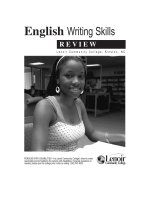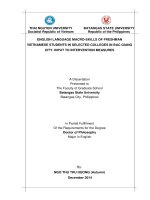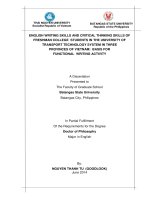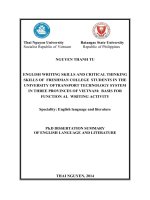English writing skills and critical thinking skills of freshman college students in the university of transport technology system basis for functional writing activity
Bạn đang xem bản rút gọn của tài liệu. Xem và tải ngay bản đầy đủ của tài liệu tại đây (5.86 MB, 194 trang )
i
THAI NGUYEN UNIVERSITY
Socialist Republic of Vietnam
BATANGAS STATE UNIVERSITY
Republic of the Philippines
ENGLISH WRITING SKILLS AND CRITICAL THINKING SKILLS OF
FRESHMAN COLLEGE STUDENTS IN THE UNIVERSITY OF
TRANSPORT TECHNOLOGY SYSTEM: BASIS FOR
FUNCTIONAL WRITING ACTIVITY
A Dissertation
Presented to
The Faculty of the Graduate School
Batangas State University
Batangas City, Philippines
In Partial Fulfillment
Of the Requirements for the Degree
Of Doctor of Philosophy
Major in English
By:
NGUYEN THANH TU
April 2015
ii
THAI NGUYEN UNIVERSITY
Socialist Republic of Vietnam
BATANGAS STATE UNIVERSITY
Republic of the Philippines
APPROVAL SHEET
This dissertation entitled “ENGLISH WRITING SKILLS AND CRITICAL
THINKING SKILLS OF FRESHMAN COLLEGE STUDENTS IN THE
UNIVERSITY OF TRANSPORT TECHNOLOGY SYSTEM: BASIS FOR
FUNCTIONAL WRITING ACTIVITY” prepared and submitted by NGUYEN
THANH TU in partial fulfillment of the requirements for the degree of Doctor of
Philosophy major in English has been examined and is recommended for Oral
Examination.
MATILDA H. DIMAANO, Ph.D.
Adviser
PANEL OF EXAMINERS
Approved by the committee on Oral Examination with a grade
of _________.
DR. AMADA G. BANAAG
Chairman
DR. MARIA LUISA A. VALDEZ
Member
DR. FELIX M. PANOPIO
Member
DR. MYRNA G. SULIT
External Representative
Accepted and approved in partial fulfillment of the requirements for the
degree of Doctor of Philosophy major in English.
Comprehensive Examination: ____________
PASSED
_____________
Date
MATILDA H. DIMAANO, Ph.D.
Dean, Graduate Studies
College of Arts and Sciences
iii
THAI NGUYEN UNIVERSITY
Socialist Republic of Vietnam
BATANGAS STATE UNIVERSITY
Republic of the Philippines
ABSTRACT
Title
: English Writing Skill and Critical Thinking Skill
of Freshman College Students in The
University of Transport Technology System:
Basis for Functional Writing Activities
Author
: Nguyễn Thanh Tú
Degree
: Doctor of Philosophy
Major
: English
Year
: 2015
Adviser
: Dr. Matilda H. Dimaano
Summary:
This study aimed to assess the English writing skills and critical thinking
skills of Freshman College students in the University of Transport Technology
System in the three provinces of Vietnam to be utilized as basis for functional
writing activity. It made use of the descriptive method of research. There were
306 students and 20 teachers who were the respondents of the study. The
data gathering instruments used were the teacher-made test for student
respondents and survey questionnaire for teacher respondents. The statistical
tools used were the mean, percentage, percentile rank, ranking, standard
deviation, t- test.
Results of the study showed that majority of the respondents are
iv
THAI NGUYEN UNIVERSITY
Socialist Republic of Vietnam
BATANGAS STATE UNIVERSITY
Republic of the Philippines
males which comprise 98 percent or 300 of the 306 total populations. This
indicates that in the universities that were studied, they were gender-based
either, they were all male school and have only started to accept female
students. In their parents’ educational attainment majority of the students’
parents have educational attainment in the “other” level or education higher
than the tertiary with 48.7 percent.
For place of origin, the students come from at least 13 different places in
Vietnam with majority or 21.0 percent coming from “Others” or different places
in Vietnam, which indicates that the three University campuses under study
cater to students coming from different places in Vietnam. As to type of school,
majority come from public high school which comprise 287 of 306 respondents
or 93.8 percent which indicates that the public high schools are the main
institutions catering to the students because public high school is free and
subsidized by the Vietnamese government.
Further, the level of writing skills of student in terms of the discourse
component is average as indicated in their average score of 9.5 correct items
with a mean score equivalent of 67.8 percent which is above 50 percent. This
value has a percentile rank of 34.3 percent. In terms of grammatical
components, the level of students’ writing skills is average based on the
v
THAI NGUYEN UNIVERSITY
Socialist Republic of Vietnam
BATANGAS STATE UNIVERSITY
Republic of the Philippines
average score of 6.6 correct items with an equivalent mean correct score of
66.3 percent.
The students have average level of skill performance in mechanics;
component skill of morphology as well as in syntax. As regards teachers’
assessment of the critical thinking skills of students, findings of the study
showed that the critical thinking skill that most respondents agree garnering a
score of 19 or 95 percent belongs to the cognitive skills classification. This is
followed by four skills that rank 2 position and all belong to the affective skill
classification. The evaluation of critical thinking skills of students according to
their frequency of use as perceived by teacher respondents indicated that the
skills ranged in frequency from 2.20 to 3.95 with equivalent rating of “Rarely” to
“Often” respectively. The same critical thinking skills were evaluated by the
teacher respondents according to their degree of importance of which result
ranged from 2.45 to 4.25 with equivalent ratings of “Less Important” to
“Moderately Important” respectively.
In terms of relationship of the ratings on level of writing skill to the
teachers’ assessment of critical thinking skills of students, findings of the study
showed that majority of the p-values of the different mean combinations were
greater than or equal to 0.05 with 104 combinations out of 165, indicating
vi
THAI NGUYEN UNIVERSITY
Socialist Republic of Vietnam
BATANGAS STATE UNIVERSITY
Republic of the Philippines
these means as not significantly related. This implies that these mean
combinations that is critical thinking item skill x writing test component skill are
statistically independent of each other.
In relation to the output of the study in the form of functional activities, it
is designed to improve the students’ critical thinking especially for this
population of Vietnamese students. The study recommended that English
teachers must engage students to varied writing activities; that the writing
activities developed may be reviewed by language teachers prior to its
utilization; and further studies may be conducted on other components of
language to determine students’ English proficiency.
vii
THAI NGUYEN UNIVERSITY
Socialist Republic of Vietnam
BATANGAS STATE UNIVERSITY
Republic of the Philippines
ACKNOWLEGMENT
The
researcher
wishes
to
express
her
sincerest
thanks
and
appreciations to those who, in one way or another, have helped her make this
dissertation a reality. The author is most grateful to:
Prof. Dr. Dang Kim Vui, President of Thai Nguyen University, Socialist
Republic of Vietnam for his contribution and support to the Doctor of
Philosophy major in English Program in collaboration with Batangas State
University, Republic of the Philippines;
Dr. Matilda H. Dimaano, Dissertation Adviser, for her guidance,
suggestions, critical comments and tenacious effort to see through the
completion of this work;
The Panel of Examiners: Dr. Myrna G. Sulit, Dr. Amada Banaag, Dr. Ma.
Luisa Valdez, Dr. Corazon B. Cabrera, Dr. Felix Panopio for their invaluable
insights, candid remarks and recommendations to enhance this study;
Dr. Do Ngoc Vien, Rector of University of Transport Technology for the
approval of the request to conduct the study;
The Respondents of the Study, for their active involvement and
cooperation in making this study possible;
Her Classmates and Colleagues, for their support friendship and
viii
THAI NGUYEN UNIVERSITY
Socialist Republic of Vietnam
BATANGAS STATE UNIVERSITY
Republic of the Philippines
inspiration; and
Finally, to her Parents, Husband, Beloved Children, Relatives, and
Friends for their whole-hearted encouragement, financial, moral and spiritual
support.
Nguyen Thanh Tu
ix
THAI NGUYEN UNIVERSITY
Socialist Republic of Vietnam
BATANGAS STATE UNIVERSITY
Republic of the Philippines
DEDICATION
This dissertation is dedicated to my loving and ever supportive husband,
Mr. Nguyen Van Khanh and my loving sons, Khanh Nam, Duc Minh, to my
family, and to my dear University of Transport and Technology (UTT)
community.
Nguyen Thanh Tu
x
THAI NGUYEN UNIVERSITY
Socialist Republic of Vietnam
BATANGAS STATE UNIVERSITY
Republic of the Philippines
TABLE OF CONTENTS
Page
TITLE PAGE .......................................................................................i
APPROVAL SHEET ...........................................................................ii
ABSTRACT ........................................................................................iii
ACKNOWLEDGMENT .......................................................................vii
DEDICATION ......................................................................................ix
TABLE OF CONTENTS ......................................................................x
LIST OF TABLES ...............................................................................xiii
LIST OF FIGURES .............................................................................xv
CHAPTER
I. THE PROBLEM
Introduction..................................................................1
Statement of the Problem ...........................................7
Scope, Delimitation and Limitation of the Study...........8
Significance of the Study .............................................9
II. REVIEW OF LITERATURE
Conceptual Literature..................................................11
Research Literature.....................................................42
xi
THAI NGUYEN UNIVERSITY
Socialist Republic of Vietnam
BATANGAS STATE UNIVERSITY
Republic of the Philippines
Synthesis ...................................................................49
Theoretical Framework ..............................................52
Conceptual Framework ..............................................54
Hypothesis..................................................................57
Definition of Terms......................................................57
III. RESEARCH METHOD AND PROCEDURE
Research Environment ................................................60
Research Design .........................................................61
Subjects of the Study ..................................................61
Data Gathering Instrument...........................................63
Data Gathering Procedure...........................................64
Statistical Treatment of Data .......................................66
IV. PRESENTATION, ANALYSIS AND INTERPRETATION OF
DATA ..........................................................................67
V. SUMMARY, CONCLUSION AND RECOMMENDATION
Summary of Findings..................................................125
Conclusions ................................................................132
Recommendation .......................................................133
BIBLIOGRAPHY..................................................................................135
xii
THAI NGUYEN UNIVERSITY
Socialist Republic of Vietnam
BATANGAS STATE UNIVERSITY
Republic of the Philippines
APPENDICES
A. Questionnaires..................................................................142
B. Questionnaire on Teacher’s Assessment of
the Critical Thinking Skills of Students..............................153
C. Validation Letters...............................................................162
D. Request Letters..................................................................165
E. Documentation...................................................................168
F. Psychrometric Table...........................................................175
CURRICULUM VITAE
xiii
THAI NGUYEN UNIVERSITY
Socialist Republic of Vietnam
BATANGAS STATE UNIVERSITY
Republic of the Philippines
LIST OF TABLES
Table
Title
Page
1
Distribution of Sample Respondents................................62
2
Gender of Student Respondents......................................68
3
Parent's Educational Attainment.......................................69
4
Place of Origin of Student Respondents...........................71
5
High School Attended by the Student Respondents .......72
6
Performance in the Different Components
of the Writing Skills Test...................................................73
7
Student Cognitive Skills Assessed by
Teacher Respondents.....................................................84
8
Students’ Affective Disposition Skills Assessed by
Teacher Respondents......................................................85
9
Students’ Cognitive Skills According to the
Frequency of Use............................................................86
10
Students’ Affective Skills According to the
Frequency of Use............................................................88
11
Students’ Cognitive Skills According to the Degree of
Importance.......................................................................89
xiv
THAI NGUYEN UNIVERSITY
Socialist Republic of Vietnam
12
BATANGAS STATE UNIVERSITY
Republic of the Philippines
Students’ Cognitive Skills According to the Degree of
Importance......................................................................91
13
Levels of Writing Skill and Critical Thinking Skills of
Students (Shown as p-values).......................................93
14
Bases for Functional Writing Activity..............................97
xv
THAI NGUYEN UNIVERSITY
Socialist Republic of Vietnam
BATANGAS STATE UNIVERSITY
Republic of the Philippines
LIST OF FIGURES
Figure
1
Title
Page
Conceptual Paradigm of the English Writing
Skills and Critical Thinking Skills of
Freshman College Students..................................56
1
THAI NGUYEN UNIVERSITY
Socialist Republic of Vietnam
BATANGAS STATE UNIVERSITY
Republic of the Philippines
CHAPTER I
THE PROBLEM
Introduction
The study of the English language has taken a multifaceted dimension
and has span from the knowledge-based format to the skill- based format. It
has also moved from theory to practice and much more as the business world
has taken an aggressive position to demand the criteria for hiring their
personnel to include certified demonstrable English language skill.
While it is true that the skill components of the English language include
macro and micro skills, it becomes a challenge to the various investigators,
evaluators, learners and teachers where the focus of the skills acquisition
should be. Other linguistic experts advocate that the focus should be in
speaking or oral communication and this should be developed to an advance
level like a functional speaking skill. If this direction is pursued, it will carry with
it the necessary pedagogical components from the theory to practice, that
would best and effectively achieve the objective of becoming a functional
speaker.
In the same way that others would focus on writing or written
communication as a skill requiring advanced level of competency, there are
2
THAI NGUYEN UNIVERSITY
Socialist Republic of Vietnam
BATANGAS STATE UNIVERSITY
Republic of the Philippines
bandwagon of concepts and pedagogical practices gearing towards the
effective development of writing skills. Surprisingly, in the literatures and in
practice, these two linguistic skills are biasedly given the priority focus, seldom
can be heard of for functional listening or functional reading as if these skills
are not equally important. Apparently these skills are considered to be
assumed skills at the back of speaking and writing skills.
Moreover, the business sector, the sector that creates the demand for
the commercial value of human skills would put a high tag price for highly
competent speakers and writers rather than the highly competent listeners and
readers. Thus, the speaking and writing skills especially in the English
language are valuable items, hot assets that can make or break one’s career.
Between speaking and writing however, linguistic experts would
consider writing as the more advanced skill for a number of reasons. Speaking
is a skill that is easily learned first and one need not be an expert in grammar
to be able to speak English fluently. A fluent speaker like a TV host or news
commentator may be very eloquent but could be in fact, a lousy writer. A good
writer however, implies an expertise and skill in speaking. One cannot be a
good writer and yet become a poor speaker as the tools in writing are at the
writer’s disposal and conveniently captured in concept and use during a
3
THAI NGUYEN UNIVERSITY
Socialist Republic of Vietnam
BATANGAS STATE UNIVERSITY
Republic of the Philippines
speaking activity. Thus writing is the most advance form of skill in the English
language.
Writing as an act is encoding an idea, a thought, a reflection; a process
of putting one’s thought into words. And this would require that the words are
organized to convey the idea, the way the writer would want the reader to
receive the message and experience the writer’s concept. Thus, the demand
for writing is more rigorous than speaking.
In writing, one must have an extensive vocabulary at once disposal to be
able to use the right words corresponding to the idea or message. Thus, the
writer, must have a full grasp of the common meaning and special meaning
and use of those words. The writer must also know how sentences are
constructed in the English language so that these sentences become coherent
and cohesive and to create linguistic impact along these sentences these
should be grammar, syntax, morphology,
Writing can be easy if the topic is of the interest to the writer and the
writer has a choice of what to write about. The writing becomes more difficult
when it becomes purposive and the sentence construction would demand
complex sentences, and ideas have to be captured in a very precise and few
words. Thus, both simple and purposive writing demand a strong cognitive
4
THAI NGUYEN UNIVERSITY
Socialist Republic of Vietnam
BATANGAS STATE UNIVERSITY
Republic of the Philippines
skill to the writer. The cognitive skills entail an implicit ability to the writer to
shift through facts that are relevant to the topic of concern and be able to
weigh them accordingly if they have substance that are relevant and can be
incorporated in the developing concept.
In the present language curricula in the educational system, writing skills
development has gradating degree where students at the elementary levels
are required to write formal themes compositions with a freedom of topic
choice at the beginning and later a specific chosen topic given by the teacher
as the basis. Writing skills in the secondary level
are developed through
essays and reaction papers.
In the tertiary level, it is a blend of the secondary level materials as well
as the writing of a thesis, a more extensive type of writing piece that would
cover an analytical step where an idea is expounded, from the information of
previous literatures and moving forward to a proposed idea or concept and
providing evidence for the new proposal. The process goes on and on in the
tertiary and higher levels of education. Hence, cognitive skill is vital in each
step of the writing skills development.
Critical thinking on the other hand as stated by Michael Scriven and
Richard Paul in the Annual International Conference on Critical Thinking and
Education Reform is the intellectually disciplined process of actively and
5
THAI NGUYEN UNIVERSITY
Socialist Republic of Vietnam
BATANGAS STATE UNIVERSITY
Republic of the Philippines
skilfully conceptualizing, applying, analysing, synthesizing, and/or evaluating
information gathered from, or generated by, observation, experience,
reflection, reasoning, or communication, as a guide to belief and action. In its
exemplary form, it is based on universal intellectual values that transcend
subject matter divisions: clarity, accuracy, precision, consistency, relevance,
sound evidence, good reasons, depth, breadth, and fairness. It entails the
examination of those structures of elements of thought implicit in all reasoning:
purpose, problem, or question-at-issue: assumptions; concepts; empirical
grounding; reasoning leading to conclusions; implications and consequences;
objections from alternative viewpoints; and frame of reference.
In critical thinking, motivation plays an important role. It is often
manifested in the skilful manipulation of ideas in service of one’s own or one’s
groups’ vested interest when grounded in selfish motives. It becomes a higher
order intellectually when grounded in fair-mindedness and intellectual integrity.
Critical thinkers live rationally, reasonably and analyse, assess, and improve
thinking. In developing the intellectual virtues of intellectual integrity, humility,
civility, empathy, sense of justice and confidence in reason critical thinkers
work diligently.
As in the case of students, critical thinking skills can be manifested on
6
THAI NGUYEN UNIVERSITY
Socialist Republic of Vietnam
BATANGAS STATE UNIVERSITY
Republic of the Philippines
different levels. They need first to recall by retrieving information from long
term memory like recognizing differences or understanding meaning. Students
may also engage in summarizing the differences for them to understand
meaning. They may also analyse concept into its logical parts. They can also
make comparison and contrast and analyze similarities and differences.
Students then may engage in evaluation using set of criteria and may
identify references and construct their own meaning. Rational thinking and
finding solutions are clearly the focus of critical thinking. Students must focus
on the quality of their thinking and explore whether or not their thinking is good
to their lives. They must also think about their choices, engage in fair-minded
questions formulation, avoiding simplistic thoughts, and show relationship.
As college teacher teaching Basic English, the researcher observed that
students have difficulty in writing longer composition. They tend to commit
errors in the construction of sentences, failed to observed correct
punctuations, and other aspects in mechanics of writing. Their levels of critical
thinking in terms of cognitive, affective, and their disposition are needed to
determine as they also play significant role to their learning. With these
contentions, the researcher is prompted to conduct the study.
7
THAI NGUYEN UNIVERSITY
Socialist Republic of Vietnam
BATANGAS STATE UNIVERSITY
Republic of the Philippines
Statement of the Problem
This study aimed to assess the English writing skills and critical thinking
skills of Freshman College students in the University of Transport Technology
System in the three provinces of Vietnam to be utilized as basis for functional
writing activity.
Specifically, the study sought answers to the following questions:
1. What is the demographic profile of students in terms of
1.1 gender;
1.2 parent's educational attainment;
1.3 student's place of origin; and
1.4 type of high school attended?
2. What are the levels of writing skills of students relative to:
2.1 discourse component (cohesion and coherence);
2.2 grammatical component;
2.3 mechanics;
2.4 morphology; and
2.5 syntax?
3. How do teachers assess the critical thinking skills of students with reference
to:
3.1 cognitive skills; and
8
THAI NGUYEN UNIVERSITY
Socialist Republic of Vietnam
BATANGAS STATE UNIVERSITY
Republic of the Philippines
3.2 affective disposition skills?
4. Are there significant relationships between the levels of students’ writing
skills and critical thinking skills?
5. What functional writing activities may be proposed to enhance student's
writing and critical thinking skills?
Scope, Delimitation and Limitation of the Study
This study is focused on determining the level of students’ writing skills
in terms of discourse component, grammatical component, mechanics,
morphology and syntax as well as the level of students’ critical thinking skills
relative to cognitive skill and affective disposition skill. Demographic profiles of
students were also determined with reference to age, parents’ educational
attainment, students’ place of origin, and type of high school attended.
Respondents of the study include the 306 first year English language
students from University of Transport Technology system and twenty English
teachers.The students were made to answer to a validated teacher made
questionnaire designed to assess their level of writing skills while the teachers
were asked to answer a survey cognitive skill assessment questionnaire where
they rated, based on their perception, the critical thinking skill level of their
students. These two questionnaires were the source of quantitative data
9
THAI NGUYEN UNIVERSITY
Socialist Republic of Vietnam
BATANGAS STATE UNIVERSITY
Republic of the Philippines
that were analysed statistically.
The study sites were Hanoi campus, Thai Nguyen campus, Vinh Yen
campus of University of Transport Technology system in the three provinces of
Vietnam in an urbanized area. Demographic information was gathered from
the students and teachers through the questionnaires but their names were not
revealed.
The respondents were those currently enrolled in an English course
while the teacher respondents were the respective teachers of the evaluated
students as they were the ones assessed their students’ cognitive skills. The
students’ respondents were limited only to those who were enrolled in their
Basic English course and teachers who were teaching other English courses
were excluded in the study.
Significance of the Study
This study is important to different individuals, organizations and policy
makers.
Students. This will be significant to the students as they will have a
chance to participate in a writing skills assessment study. The results of this
work will benefit the students in general because a remedial strategy in this
case a functional writing activity will be designed catering to their specific
10
THAI NGUYEN UNIVERSITY
Socialist Republic of Vietnam
BATANGAS STATE UNIVERSITY
Republic of the Philippines
needs.
English Teachers. This will benefit the teachers not only because the
will be involved in the study but they will also gain insights from the results and
will have a chance to utilize the developed remedial activities for their future
students.
Administrators. Results of the study will benefit them as they will be
guided by the findings on what decisions they will make regarding the
adequacy of the students’ writing skills and implement remedial measures that
will improve students’ English writing skills of their schools.
Parents. Findings of the study give them information as to the level of
writing skills of their children and may find ways of helping them improve these
skills through active participation in the learning process.
Policy-makers. The policymakers will be benefited from the insight that
will be gathered in this study. They will be able to formulate specific and
relevant laws that could influence the current educational system as they will
have a concrete basis for doing so.
Current and Future Researchers. The study may encourage other
researchers to engage in similar studies which will provide various ideas and
practical recommendations.









